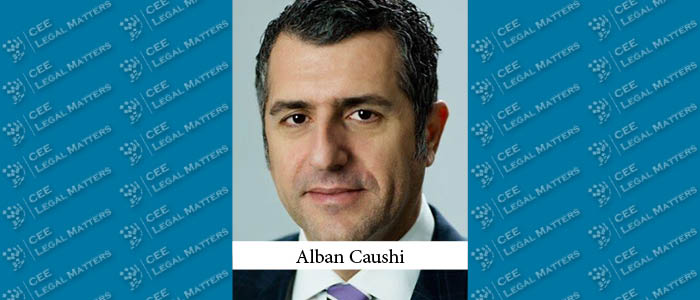The Czech economy entered a deep slump in 2023 caused by the rather rare and unfortunate combination of negative economic and geopolitical factors, including one of the highest inflation rates in the EU, rising interest rates, high energy prices, a large public finance deficit, and the adverse impacts of the war in Ukraine. Altogether, these economic difficulties resulted not just in an economic recession but also adversely affected the Czech M&A market.
Mortgage Extension to Subsequently-Built Objects in Bosnia and Herzegovina
While local courts have been taking the stance that mortgage over the land does not extend to objects subsequently built on the mortgaged land, in one recent case, the Supreme Court of Republika Srpska (RS Supreme Court) took an entirely opposite one. Applicable laws support the stance of the RS Supreme Court. Clear treatment of this issue by the courts is important for both mortgage creditors and buyers of subsequently-built objects.
Challenges of Intellectual Property Rights in Bosnia and Herzegovina
Respecting intellectual property rights (IPR) in Bosnia and Herzegovina is a journey less traveled, yet one of paramount importance in today’s digital age. In a world where information knows no bounds and creative works are easily shared with a click, the value of safeguarding original ideas and innovations often takes a back seat. Let’s dive into this exploration of the complexities surrounding intellectual property in a landscape where imitation frequently overshadows ingenuity. The lack of awareness and enforcement mechanisms regarding IPR poses significant challenges for creators and innovators striving to protect their work. Without proper safeguards in place, the risk of exploitation and unauthorized use looms large, hindering the growth of a dynamic and inventive environment within the nation. Additionally, as technology continues to advance at a rapid pace, navigating the intricate web of intellectual property laws becomes increasingly daunting for individuals and businesses alike.
Montenegro: Legal Insights into Investing in the Hotel Industry
In the last decade, Montenegro has focused on creating a favorable business environment, attracting renowned foreign investors and resulting in significant economic development and growth. The government has been focusing on high-level tourism, transitioning from seasonal to year-round hotels that offer luxurious stays and services.
Slovenia: Above-Standard Construction in Slovenia and ESG Requirements
The Slovenian real estate market is characterized by an excess of demand over supply, especially in the residential real estate sector, which has pushed property prices sky-high. Low interest rates on financing in recent years have led to a number of easy-profit-seeking (half-professional) investors – usually project companies building so-called “above-standard” construction.
Estonia: Challenges of Large-Scale Construction Projects in Estonia
In a compact nation like Estonia, the prominence of construction projects can swiftly transcend local interests and become matters of national interest. The escalation of public attention toward large-scale construction projects invites heightened scrutiny by different interest groups. Notably, several recent projects have become entangled in legal disputes, profoundly impacting anticipated timelines and financial forecasts. This article aims to delineate emerging patterns from recent cases and offer recommendations aimed at preventing and avoiding legal contentions.
Kosovo: An Overview of Foreigner’s Property Rights in Kosovo
The ever-growing real estate market in Kosovo shows no signs of stopping. Even amid high prices, demand for real estate keeps growing. This demand is largely driven by Kosovo’s diaspora living in the EU and other Western countries. It is also fueled by foreign nationals and foreign companies who find properties in Pristina and other major cities in Kosovo attractive as investments.
Bosnia and Herzegovina: An Overview of Real Estate Legislation
Bosnia and Herzegovina (BiH) is a country in the south-east of Europe (the so-called “Balkan region”) with an area of 51,229 square kilometers. In accordance with its political and legal structure, BiH is divided into two entities (the Federation of Bosnia and Herzegovina – FBIH – and Republika Srpska – RS) and the Brcko District (BD BIH). The real estate market is a significant part of the economic activity of BiH and is governed by a set of legal regulations which follow international standards for the protection of property rights. In the course of 2022 and 2023, there was a strong investment wave in the real estate market.
Slovakia: The Problem with Building Permits
Permitting of any projects is a long-standing problem in the Slovak Republic. In international surveys, Slovakia ranks at the bottom, as it takes an average of 300 days to permit a simple building such as a family house. This problem becomes much more acute in the case of constructions that are more complicated and require the assessment of several administrative bodies or may have a significant impact on the environment.
North Macedonia: The Growth of Real Estate Prices and the Demand for Buying and Selling Real Estate
In recent years, the real estate market in the Republic of North Macedonia, particularly in its capital city of Skopje, has witnessed significant activity. Statistics indicate a consistent trend of construction and sale of numerous residential apartments. Notably, despite the steady increase in real estate prices since 2021, there has been a notable surge in demand for residential apartment purchases. Concurrently, investor interest in constructing residential and office buildings remains robust, showing no significant signs of decline.
Bulgaria: Real Estate Trends and Projects Status
Although 2024 is just beginning, below we have summarized the trends and projects expected to have an impact on the development of the real estate market in Bulgaria:
Czech Republic: Desired Acceleration of Permitting Processes in Jeopardy
The annoying length of the construction permitting process in the Czech Republic became a notoriety. Thanks to this, the prices of new dwelling premises are sky-high, and foreign investors are leaving their projects because they are unable to plan their investment – a striking example of which is the recently abandoned Microsoft project of a new data center in Prague.
Croatia: Decentralization of State Property Management in Croatia Benefiting Developers of Greenfield Real Estate Projects?
Due to various historical reasons, a large percentage of undeveloped construction land in Croatia is still owned by the state. As a result, developers of (primarily greenfield) real estate projects have often had to go through a laborious and lengthy process to acquire construction land from the Republic of Croatia. Recent legislative changes could mark a decisive shift toward decentralization and a more efficient management system, potentially streamlining processes that were previously mired in bureaucratic complexities.
Serbia: (Un)Just Changes in Land Conversion and Registration in the Cadastre
During 2023, there have been significant changes in the legal regulations in the field of planning and construction as well as in terms the Real Estate Cadastre in Serbia. In August, amendments to the Law on Planning and Construction entered into force, while in November, amendments to the Law on the Registration Procedure with the Cadastre of Real Estate and Utilities (which is now called the Law on the Registration Procedure with the Real Estate Cadastre and Infrastructure Cadastre) entered into force.
Greece: Unveiling the Roadmap in Greek Tourism Investment – Trends and Challenges
Tourism in Greece is flourishing, and with international tourism expected to reach – and exceed – pre-pandemic levels, it is no wonder that investors from all over the world are flocking to Greece.
Turkiye: The “Airbnb Law” – New Regulation on Short-Term Leases in Turkey
Ever since Booking.com’s activities had been suspended in Turkey by a court decision upon “unfair competition” claims raised by the Association of Turkish Travel Agencies (TURSAB), new regulations were anticipated in the short-term lease sector dominated by Airbnb, as unregistered and untaxed rental income obtained from short-term rentals has been a matter of discussion for a long time.
Albania: Examining Albania’s Real Estate Landscape – A Legal Perspective
Albania’s real estate market has undergone a significant transformation in the last decade, attracting global attention across the residential, commercial, and tourism sectors. This surge in interest is a result of the country’s economic and legislative reforms, political stability, successful justice reform implementation, and progress in the EU accession process. These factors collectively present investors with promising opportunities in Albania’s dynamic and evolving market.
Hungary: New Land Registration Procedure
Based on our experience and feedback from our clients, Hungary’s real estate law has already provided a very favorable legal environment for secure real estate investments. In the integrated land registration system, introduced in 1971, based on a cadastral map, real estate transactions are administered by one single decentralized organization comprising 20 regional and 119 district land offices.

































